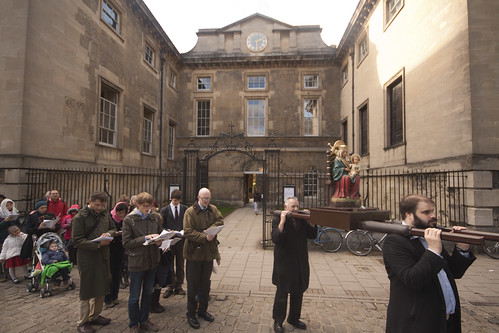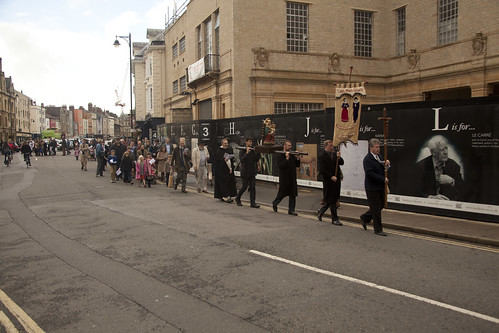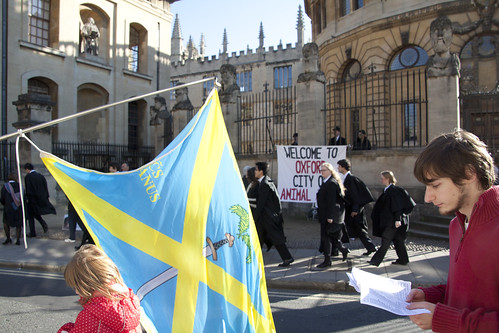 |
| LMS Oxford Pilgrimage procession outside Worcester College. |
Readers can go over there and see for themselves if I am exaggerating. Mr Squirrel tells us that, shock, horror, 'there are some individuals whose presence in a space can make people feel unsafe.' And, of course, 'universities are also our homes'. Ergo, the touchiest person in a University of over 10,000 souls should have a veto over every public conversation in the place - assuming this touchy person is touchy in a politically correct way. At least, Mr Squirrel has better be assuming that, or else disagreement between the touchy could lead to the exactly kind of debate Mr Squirrel is trying to suppress.
Although the Tab article was published after the Spectator piece, and refers to it, Mr Squirrel makes no attempt to evade Brendan O'Neil's central accusation: that students have become alarmingly subject to group-think, and ferociously intolerant of dissent. It is almost as if The Tab wanted to showcase an article which proves O'Neil right. Written by the head of a debating society - oh dear, irony has indeed passed away.
What Mr Squirrel has missed is something implied by the word 'also': universities are also our homes. So they are not only our homes, they are something else as well. What sort of thing might that be, Mr Squirrel? Could it be a place where we are presented with new ideas, where argument is used to test our existing ideas, where we are made to feel uncomfortable about what we may have taken for granted?
Brendan O'Neil too, is in danger of missing this point. He accuses the 'Stepford students' he has encountered of taking on a Mary Whitehouse attitude. But Mary Whitehouse didn't, as far as I know, try to stop debates about controversial matters of public policy taking place in universities. The focus of her concern was broadcasting, which as the name implies is undiscriminating in its audience, especially in her day when everyone had a TV but there were very few channels to watch. She was concerned about children, above all, watching violence and pornography, and she was right to be. The point about a university is that it is a privileged place for free discussion.
The Medieval universities were the same: ideas could be tested out there which would not be appropriate in other forums. The most hallowed truths could be tested against objections, and as a matter of course were so tested: lists of objections and arguments in favour for each proposition are included in the records of the debates they held, and this format came to be used in the standard works of philosophers and theologians. Does God exist? It seems not, for the following reasons... Yes, that's how St Thomas Aquinas kicks off his Summa Theologica.
Furthermore, although heretics teaching in universities could be called to account, universities went to a lot of trouble to protect them. Oxford's own John Wycliffe, who inspired not just interesting and uncomfortable thoughts but actual violence, bloodshed, and uprisings, died peacefully in his bed holding a comfortable job.
I'm not saying the Wycliffe should have been protected. As I said in a previous post, the Squirrells of this world are right that there are limits to free speech; Ms McIntyre, who organised the protest in Oxford against the debate, has a point that her protest was itself an exercise of free speech. Are they like the Catholics objecting to Tina Beattie or President Obama turning up to speak in Catholic institutions? We need to make some distinctions.
 |
| In 2013, passing the New Bodleian Library |
2. Formal speaking engagements like Beattie's and Obama's are ways of according them prestige and approval; a debate is a very different thing.
3. A formal debate might legitimise both sides to some extent, but the claim that pro-life views are so horrendously evil that they can no more be allowed on one side of a debate than those advocating mass murder is simply ludicrous. The view that 'there are too many abortions', which is essentially what Tim Stanley was going to say, is shared by a majority of the general population, including many people engaged in advocacy for legal abortion.
We still need to say something more fundamental, however, that advocates of free speech like O'Neil may not like. Universities are not neutral spaces for free discussion: there is no such thing, it incoherent even as an ideal. Everyone undertaking university applications knows - or should - that different institutions have different flavours; faculties bend in certain directions. There is nothing wrong with religious minorities or particular schools of thought setting up their own institutions. Every institution has to come up with a set of fundamental values, about what is worth debating, what is offensive, and what should be accorded prestige, and there is nothing wrong with different institutions differing on these matters: indeed, it would be more worrying if they all agreed. I'm not sure that free-speech advocates really understand this.
And that means they don't really understand what is going on in Oxford. It is not really about free speech; it is about what fundamental values should form the framework within which we all carry on our work. It is about the attempt by a vocal minority to impose a particularly demanding and limiting set of fundamental values on the whole institution: a set of values imposing a tighter straight-jacket, it would seem, than those you might find in one of those much-derided hard-core Calvinist colleges in the USA, where they make you sign a statement of faith before they employ you. These values are demanding in a peculiarly destructive way because they are wrong in a peculiarly destructive way. They hold up a terrible evil, abortion, as a good which it is blasphemous to question.
The problem is not, exactly, that Ms McIntyre and Mr Squirrel don't want to see the free interchange of ideas. The problem is that they are wrong about substantive ethical issues. They are wrong, absurdly, crassly wrong, and they need to be exposed in their error. Otherwise, universities will become unusable as institutions for education, research, and debate. The drift of serious discussion from universities to think tanks and, more recently, online, will became an avalanche.
 |
| In 2011, passing the Sheldonian Theatre, and students on their way to their matriculation ceremony. |
The president of a debating society who is against free speech! This guy is behind the times - Monty Python trademarked this sort of absurdist humour forty years ago.
ReplyDeleteIt seems that our education establishment is becoming (if it hasn't become) a place where students are indoctrinated rather than educated, from the nursery all the way to the university. Is it a coincidence that the governing class are keen on children staying in education as long as possible? I think we can see more than economic motives at work here.
ReplyDeleteYes, Simon, education will always be political. Hence the Liberal Democrats’ (the clue’s in the name) latest proposal to lower the age for compulsory sex-ed. Get 'em while they’re young….
ReplyDelete